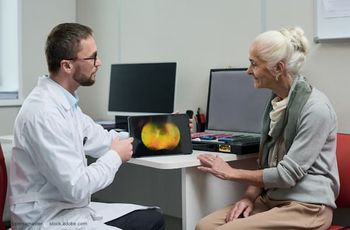
What retina specialists want you to know about neovascular AMD and DME therapies: 10 top takeaways
A panel of esteemed retina specialists recently delved into innovative therapies for neovascular age-related macular degeneration and diabetic macular edema, focusing on personalized treatment, telemedicine, and the ongoing quest for advancements.
Advancing therapies for neovascular age-related macular degeneration (AMD) and diabetic macular edema (DME) is vital due to their profound impact on patients' quality of life and the increasing prevalence of these conditions. These sight-threatening diseases can impair daily activities and independence, underscoring the urgency of innovative treatments.
Nathan Steinle, MD, a vitreoretinal specialist at California Retina Consultants in Santa Barbara, California, recently led a Modern Retina Viewpoints discussion titled, “
Dr. Steinle was joined in this discussion by:
- Prethy Rao, MD, a retina specialist, Retina and Vitreous Associates of Texas in Houston, Texas;
- Carl Regillo, MD, chief of retina services at Wills Eye Hospital in Philadelphia, Pennsylvania; and
- Adrienne Scott, MD, a vitreoretinal surgeon at Wilmer Eye Institute, Johns Hopkins University School of Medicine in Baltimore, Maryland.
Their discussion focused on the latest therapies for neovascular AMD and DME, including their efficacy, safety, and durability. Additionally, the participants shared evidence-based strategies and practical tools for improving outcomes in patients with these retina diseases.
Here are 10 top takeaways from their discussion.
1. Anti-vascular endothelial growth factor (VEGF) agents have revolutionized the treatment of neovascular AMD and DME and are considered the first-line therapy for these conditions.
According to Dr. Scott, multiple clinical trials have demonstrated the efficacy of anti-VEGF agents in improving visual acuity and reducing the risk of vision loss in patients with neovascular AMD and DME.
2. The choice of anti-VEGF agent may depend on factors such as dosing frequency, efficacy, and safety profile.
Dr. Regillo notes that while all anti-VEGF agents are effective in treating neovascular AMD and DME, there are differences in their dosing frequency, efficacy, and safety profile that may influence the choice of agent for a particular patient.
3. Combination therapy with anti-VEGF agents and corticosteroids may provide additional benefits for some patients.
Dr. Rao suggests that combination therapy with corticosteroids may provide additional benefits for some patients. Corticosteroids work by reducing inflammation in the retina, which can contribute to the development and progression of these conditions.
4. Sustained-release drug delivery systems, such as port delivery systems and intravitreal implants, may offer advantages over traditional injections in terms of durability and convenience.
Dr. Regillo notes that sustained-release drug delivery systems, such as port delivery systems and intravitreal implants, may offer advantages in terms of durability and convenience. These systems can deliver therapeutic agents over an extended period, reducing the need for frequent injections and potentially improving patient adherence to treatment.
5. Patient education and communication are critical for ensuring adherence to treatment and optimizing outcomes.
Dr. Scott emphasizes that patient education and communication are critical for ensuring that patients understand the importance of adhering to their treatment regimen and are able to manage any side effects or complications that may arise.
6. Real-world evidence can provide valuable insights into the effectiveness and safety of therapies in clinical practice.
Dr. Rao notes that real-world evidence can provide valuable insights into the effectiveness and safety of therapies in clinical practice, particularly for patients who may not have been included in clinical trials.
7. Telemedicine and remote monitoring may play an increasing role in the management of retinal diseases.
Dr. Regillo suggests that telemedicine and remote monitoring may play an increasing role in the management of retinal diseases, particularly in the context of the COVID-19 pandemic. These technologies can allow for remote assessment of disease activity and treatment response, reducing the need for in-person visits and potentially improving patient outcomes.
8. Advances in retinal imaging and diagnostics, such as optical coherence tomography (OCT) angiography and genetic testing, may help to personalize treatment and improve outcomes.
Dr. Scott notes that advances in retinal imaging and diagnostics, such as OCT angiography and genetic testing, may help to personalize treatment and improve outcomes for patients with retinal diseases. These technologies can provide valuable information about disease activity and underlying genetic factors that may influence treatment response.
9. Surgical interventions, such as vitrectomy and retinal detachment repair, remain important options for some patients with neovascular AMD and DME.
Dr. Regillo emphasized that surgical interventions, such as vitrectomy and retinal detachment repair, remain important options for some patients with neovascular AMD and DME, particularly those with advanced disease or complications such as retinal detachment.
10. Ongoing research and development are needed to continue improving therapies and outcomes for patients with retinal diseases.
All of the participants agree that ongoing research and development are needed to continue improving therapies and outcomes for patients with retinal diseases. This includes the development of new therapeutic agents, drug delivery systems, and diagnostic technologies, as well as the conduct of clinical trials and real-world studies to evaluate the safety and efficacy of these interventions.
Newsletter
Keep your retina practice on the forefront—subscribe for expert analysis and emerging trends in retinal disease management.

































